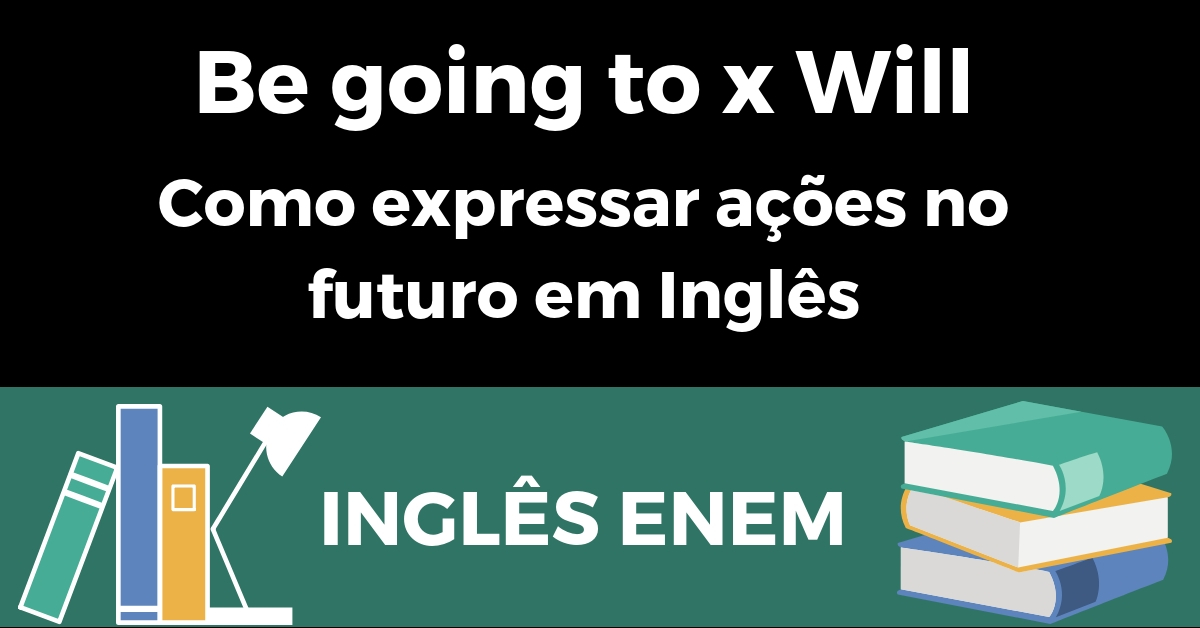Como usar “be going to” e “will” para expressar ações no futuro
Você sabe quando usar, no inglês, “will” e “be going to + verb”? Veja quando usar cada uma das expressões e entenda a diferença entre elas!
Quando falamos em coisas que estão no futuro, podemos nos referir a algo que estamos planejando fazer ou ações que provavelmente acontecerão. No inglês, usamos duas formas para expressar ações no futuro, diferenciando essas situações: “be going to” e “will”. Saiba quando utilizar cada uma delas!
Videoaula sobre futuros: future expressions
Nesta aula, o professor Luiz Carlos Neves Junior fala sobre future expressions, explorando os diferentes tempos verbais e estruturas usadas para expressar eventos futuros em inglês.
Be going to + verb
Quando estamos lidando com um fato futuro planejado, utilizamos a estrutura “be going to + verb”. Veja como construímos frases utilizamos esta forma:
Afirmativa: Para construirmos a forma afirmativa, sempre utilizamos a ordem “sujeito + verbo to be + going to + verbo principal”.
Veja o exemplo:
I am going to visit Italy in September.
(Eu visitarei a Itália em setembro.)
Negativa: Nesta forma, a partícula negativa “not” é acrescentada após o verbo to be.
I am not going to visit Italy in September.
(Eu não visitarei a Itália em setembro.)
Interrogativa: Na forma interrogativa, o verbo to be sempre inicia as perguntas.
Veja o exemplo:
Are you going to visit Italy in September?
(Você visitará a Itália em setembro?)
Atenção! É importante ressaltar que o uso de “be going to + verb” é mais formal de falar sobre ações futuras. Em ambientes menos formais e principalmente, na língua falada, o falante nativo acaba optando pelo “present continuous” para expressar o futuro. Observe:
Present continuous
Afirmativa: Na forma afirmativa do present continuous, a ordem de construção da oração é sempre “sujeito + verbo to be + going to + verbo principal”.
Observe o exemplo:
I am visiting Italy in September.
(Eu visitarei a Itália em setembro.)
Negativa: A partícula negativa “not” é acrescentada após o verbo to be.
I am not visiting Italy in September.
(Eu não visitarei a Itália em setembro.)
Interrogativa: Na forma interrogativa, o verbo to be sempre inicia as perguntas.
Are you visiting Italy in September?
(Você visitará a Itália em setembro?)
Will + verb
Finalmente, quando estamos lidando com um futuro provável, mas não planejado ou com uma decisão para o futuro que você acabou de tomar, utilizamos a estrutura “will + verb”:
Afirmativa: Na forma afirmativa, sempre construímos a frase da seguinte maneira: sujeito + will + verbo principal.
Veja os exemplos:
I will go to the party tonight.
(Eu irei à festa hoje à noite.)
I will be at home.
(Eu estarei em casa.)
Negativa: A partícula negativa “not” é acrescentada após “will”.
I won’t go to the party tonight.
(Eu não irei à festa hoje à noite.)
I won’t be at home.
(Eu não estarei em casa.)
Atenção! “Won’t” é a contração de “will not”, que é mais utilizado para ênfase.
Interrogativa: Na forma interrogativa, “will” sempre inicia as perguntas.
Will you go to the party tonight?
(Você irá à festa hoje à noite?)
Will you be at home?
(Você estará em casa?)
Em contextos mais formais, o modal “shall” também pode ser usado para expressar futuro. Como na icônica frase do Senhor dos Anéis:
“You shall not pass!”
Afirmativa:
You shall pass.
(Você passará.)
Negativa:
You shall not pass.
(Você não passará.)
Para confirmar que você entendeu, vamos analisar o poema abaixo, escrito em 1932 por Langston Hughes, poeta negro americano.
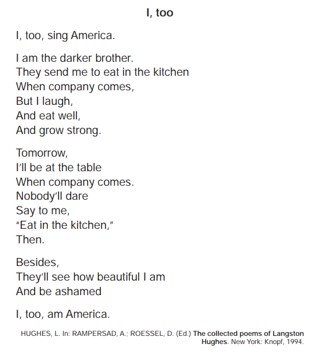
Na segunda estrofe do poema, podemos perceber a temática do racismo:
“I am the darker brother (Eu sou o irmão mais escuro)
They send me to eat in the kitchen (Eles me mandam comer na cozinha)
When company comes (Quando as visitas chegam)”
Uma vez que o negro é caracterizado como a mão de obra desumanizada do círculo social branco. O que contrapõe fortemente com a primeira estrofe:
“I, too, sing America” (Eu também canto a América)
A qual localiza o negro como cidadão americano.
Observe que o sonho de uma pátria mais justa é expresso em um futuro incerto na terceira e quarta estrofes:
“Tomorrow (Amanhã)
I will be at the table (Eu estarei à mesa)”
…
“Besides, (Além disso)
They’ill see how beautiful I am (Eles verão quão lindo eu sou)
And be ashamed (E se envergonharão)”
Caso a estrutura “will + verb” não fosse utilizada, esse contexto de um futuro próximo, mas incerto não seria transmitido.
Videoaula
Para finalizar sua revisão, veja a videoaula sobre simple future do nosso canal!
Quer fixar ainda mais a diferença entre “will” e “be going to”? Veja o infográfico no post do nosso perfil do Instagram:
Ver essa foto no InstagramUma publicação compartilhada por Curso Enem Gratuito (@cursoenemgratuito)
Exercícios sobre “be going to” e “will”
Sumário do Quiz
0 de 10 questões completadas
Perguntas:
- 1
- 2
- 3
- 4
- 5
- 6
- 7
- 8
- 9
- 10
Information
.
Você já fez este questionário anteriormente. Portanto, não pode fazê-lo novamente.
Quiz is loading...
You must sign in or sign up to start the quiz.
Para iniciar este questionário, você precisa terminar, antes, este questionário:
Resultados
0 de 10 perguntas respondidas corretamente
Seu tempo:
Acabou o tempo
Você conseguiu 0 de 0 pontos possíveis (0)
| Pontuação média |
|
| Sua pontuação |
|
Categorias
- Sem categoria 0%
- 1
- 2
- 3
- 4
- 5
- 6
- 7
- 8
- 9
- 10
- Respondido
- Revisão
-
Pergunta 1 de 10
1. Pergunta
(Mackenzie SP/2018)
Considering the dialogues in this strip, mainly in the first and second boxes, the use of will and going to to express future can be explained by:
CorretoParabéns! Siga para a próxima questão.
IncorretoResposta incorreta. Revise o conteúdo nesta aula sobre Be going to x Will – Como expressar ações no futuro em Inglês para acertar na hora da prova!
-
Pergunta 2 de 10
2. Pergunta
(UEG GO/2018)
Predictions for the future of ‘smart’ education
Posted by Charley Rogers – January 22, 2018
A wave of new technology has been introduced into schools up and down the country changing the way teachers deliver lessons and how students learn.
A research by Randstad Education found schools and colleges have adopted the latest tech to improve teaching and make lessons more interactive and engaging. Some of the innovations already in use include ‘gamifying’ lessons by incorporating game-like rules and tasks to increase motivation. For example, Shireland Academy in the West Midlands included Minecraft on its curriculum.
Education, the research found, will become more project-based and include more interactive content to keep up with students’ changing attitudes towards traditional media. Classrooms, it is predicted, will join the Internet of Things – a network of devices like smartwatches that connect and share data with other items and systems – and create ‘smart schools’ where the teachers, students and devices become more connected.
Pressure on teachers – 75% find their workload unmanageable – as well as rising student numbers means technology will play a larger role performing tasks to save time. Teachers are also reaping the rewards as lessons and assessments move out of the classroom and onto platforms that make it easier for them to chart progress and achieve a better work-life balance. Education experts have highlighted the importance of new techniques that help teachers do their jobs.
However, while tech will become more commonplace in the classroom, it is expected to compliment teachers and not replace them. It´s important to understand that teaching tools have come a long way since the days when teachers used to write on chalkboards and present using an overhead projector.
The research says that students today benefit from some of the most exciting technology available to schools, but it’s not just the pupils who benefit from these innovations through invigorating lessons and virtual learning. Teachers are also reaping the rewards as lessons and assessments move out of the classroom and onto platforms that make it easier for them to chart progress and achieve a better work-life balance.
Technology has arrived and the teachers and classrooms of tomorrow are here today.
Disponível em: <https://edtechnolo-
gy.co.uk/Article/predictions-for-the
-future-of-education>. Acesso em:
19 set. 2018. (Adaptado).Analisando os aspectos linguísticos e estruturais do texto, constata-se que
CorretoParabéns! Siga para a próxima questão.
IncorretoResposta incorreta. Revise o conteúdo nesta aula sobre Be going to x Will – Como expressar ações no futuro em Inglês para acertar na hora da prova!
-
Pergunta 3 de 10
3. Pergunta
(IME RJ/2015)
“I have a dream that one day, on the red hills of Georgia, the sons of former slaves and the sons of former slave owners _________________ sit down together at the table of brotherhood.” (Martin Luther King)
CorretoParabéns! Siga para a próxima questão.
IncorretoResposta incorreta. Revise o conteúdo nesta aula sobre Be going to x Will – Como expressar ações no futuro em Inglês para acertar na hora da prova!
-
Pergunta 4 de 10
4. Pergunta
(UNCISAL AL/2013)
I tweet, I pin, I do
I asked my girlfriend to marry me on a boat on the wide expanse of Lake George. There was no iPhone to capture the moment, no Twitter to tweet or Facebook to share, and, back at our campsite, no AT&T service to call home with the news. There were only s’mores. And champagne.
For the two of us, it was nice. But I’ll tell ya, future marrieds: the lull couldn’t last. Within minutes, we were in my Jeep, driving 10 miles out of the woods, where we sat on the shoulder of a road trying, to no avail, to make the engagement “Facebook official.” (Turns out you can’t update your relationship status from the iPhone app. A Facebook spokesperson says the company plans on adding this feature in the future.) Lacking the digital evidence, we wondered, had it even happened?
With five weeks behind us and still a year out from the date, the engagement is as real as the ring. Our wedding now has a hashtag, a website in the works, and a growing list of potential vendors we’ve found online. Yelp is our beacon. Facebook our guide. (No surprise: in my day job I’m head of social media at Newsweek and The Daily Beast, managing accounts and watching for news.) My fiancee has grown particularly fond of Pinterest, the photo-sharing network used by a whopping 19 percent of women on the Internet, per one recent Pew study. To my eyes, weddings are the central reason it exists. “Pinterest is a tool people use to find inspiration for the important things they want to do in their life,” a spokesperson explained to me. “Planning a wedding is a great example.” This past July, Pinterest doubled down, creating a separate category for weddings. The same month Facebook ̶ its users aging into love and marriage ̶ introduced a feature displaying special events, starting with engagements and weddings, alongside friends’ birthdays when you log in. (Babies are there, too.)
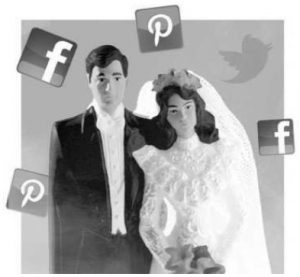
Disponível em
http://www.thedailybeast.com/newsweek/2012/10/14/ (adaptado)Qual dos tempos verbais abaixo não é encontrado no texto?
CorretoParabéns! Siga para a próxima questão.
IncorretoResposta incorreta. Revise o conteúdo nesta aula sobre Be going to x Will – Como expressar ações no futuro em Inglês para acertar na hora da prova!
-
Pergunta 5 de 10
5. Pergunta
(UEPB/2010)
Building Ectopia
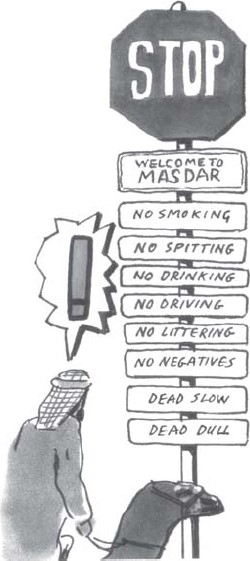
Although most cities seem to form by accident, for thousands of years, some of them have been designed. Whether for defense, beauty or practicality, urban designers have imposed their ideas of what a city should be about. […] Masdar, which means “the source”, is a 1,500 acre project including housing, commercial and manufacturing space for eco-friendly products and a university. […] The Masdar Institute of Science and Technology (MIST) will be dedicated to renewable energy. […] The city will also have a 10MW photo-voltaic farm. By 2010 Masdar will be able to accommodate 2,000 people but ultimately it will be home to 50,000.Most of the city’s electricity will come through solar power. Renewables will also support a desalination plant that will provide fresh water. Creating the city is a feat of integration […] requiring a fusion of technologies, systems and policies. Finding ways of using less energy and water has been a crucial part of the planning. Through a smart metering system, at any given moment a citizen of Masdar will be aware of how much energy, water and carbon he or she is consuming compared with the average citizen. There is, though, more to this picture of ectopia than meets the eye. A huge degree of central planning, control and even restrictions on individual freedoms is needed to make Masdar work. […] Cars will not be permitted (the city provides electric pods to transport people and goods), and starting a business is not straightforward .Commercial activities will be restricted to those that “add value” to the city. To keep Masdar carbon-neutral, businesses that use lots of hydrocarbons will not be welcome. […] Will such a paternalistic city work well? Social factors are crucial in getting cities to hum. Masdar’s advertising states that “one day, all cities will be built like this.” This is not the case. For one thing, Masdar is experimental and a work in progress. What emerges will not necessarily translate well elsewhere.
(by Natasha Loder, From The World in 2009)
The frequent use of the modal auxiliary “will” in TEXT indicates
CorretoParabéns! Siga para a próxima questão.
IncorretoResposta incorreta. Revise o conteúdo nesta aula sobre Be going to x Will – Como expressar ações no futuro em Inglês para acertar na hora da prova!
-
Pergunta 6 de 10
6. Pergunta
(UFAC/2010)
INVENTING THE FUTURE
1Imagine a computer that will recognize faces of people and help you to remember their 2names, or a smart car that will wake up the driver when he is falling asleep at the wheel. 3Scientists and engineers at the Massachusetts Institute of Technology (MIT) Media Lab believe 4all this and more will soon be possible. Projects like smart cars, smart houses, wearable 5computers and virtual pet dogs may contain the seeds of future innovations that will make life 6safer, easier, healthier or simply more fun. Scientists and engineers are literally inventing the 7future.
8A car that will alert drivers to potential problems or wake up the driver if he is getting 9sleepy seems like a futuristic fantasy, but the scientists and engineers at the MIT Media Lab are 10working to make this dream a reality. A computer in the car will recognize impending signs of 11trouble and help prevent accidents.
12Computers in your shoes, clothing or eyeglasses may seem like science fiction, but on the 13MIT campus it is already happening. In fact, MIT students wear computer all the time. One day 14soon, you will put on your computer instead of working at a desk. In some visions of the future, 15keyboards and the passive boxes that house the microprocessor will completely disappear. 16Computers in the future will also be quite different in brain power and applications from what 17we use today. You will probably talk to your future computer and it may even remind you of 18appointments and assignments or the names and faces of people you meet.
19The MIT Media Lab is a dream factory where scientists and engineers play with 20technology. The lab explorers such concepts as virtual reality, artificial intelligence, 21communications and other computer applications, from education to entertainment. The 22activities of the MIT visionary pioneers of the digital revolution are part of an integrated 23approach to technology. Some of their research projects may seem quite extraordinary, but they 24basically require just the creativity of the most powerful thinking machine on Earth: the human 25brain.
Adapted from Science American Frontiers.
http://www.pbs.org /safarchive/4_class. Accessed August, 2009.
The text is full of grammatical elements that compose its structure to offer a plain reading comprehension. Based on this idea and in the text I, judge the CORRECT following statements:
Correto
Incorreto
-
Pergunta 7 de 10
7. Pergunta
(UFRR/2010)
Mary: “I am about to fall asleep. I need to wake up!
Clare: “I ________you some coffee.”
CorretoParabéns! Siga para a próxima questão.
IncorretoResposta incorreta. Revise o conteúdo nesta aula sobre Be going to x Will – Como expressar ações no futuro em Inglês para acertar na hora da prova!
-
Pergunta 8 de 10
8. Pergunta
(FMTM MG/2003)
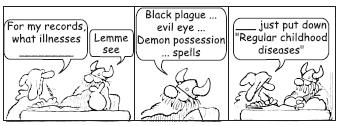
Escolha a alternativa que completa, correta e adequadamente, os espaços em branco da história em quadrinhos.
CorretoParabéns! Siga para a próxima questão.
IncorretoResposta incorreta. Revise o conteúdo nesta aula sobre Be going to x Will – Como expressar ações no futuro em Inglês para acertar na hora da prova!
-
Pergunta 9 de 10
9. Pergunta
(UNISC RS/2002)
Texto II
What causes memory loss?
There are hundreds of potential causes including stress, alcoholism, lack of slee p, medications like antirejection drugs taken by transplant patients. Also nutritional deficiencies, seizure disorders, thyroid and kidney disease. I think we1 should treat memory loss as a symptom.
Lots of young professionals are patients of mine2 and some have diseases and others have stress that they can’t manage. Our job is to try to figure out whether the memory loss is due to a disease.
How do you pinpoint the cause?
It shouldn’t be haphazard but targeted. We have patterns to follow, a list of potential culprits and tests to rule out things. In most industrial nations, over 65 percent of memory impairment is due to Alzheimer’s disease. The key to Alzheimer’s is early detection, which3 is difficult because nerve cells must be depleted by 80 percent before symptoms occur.
And no matter what you do, those cells aren’t going to Resuscitate5. So we are looking for biological markers – a blood test or X-ray that will predict who is about to get the disease so we can act before the symptoms develop.
What can be done now for Alzheimer’s?
All the drugs approved by the Food and Drug Administration for Alzheimer’s boost the level of acetylcholine, which is one of the key neurotransmitters and is especially important for memory circuits. We have known for 30 years that acetylcholine levels decline in almost all Alzheimer’s patients. These drugs palliate the problem, but They4 will not prevent the disease’s eventual progression. The hot topic right now is MCI – minimum cognitive impairment, which occurs before full-blown Alzheimer’s.
Our goal is to delay Alzheimer’s by five years which would totally change the person’s quality of life. An Alzheimer’s vaccine study is now underway and if it works in humans, it would be great.
For information, Alzheimer’s Association, 305-891-6228 in Miami-Dade; 954-726-0002 in Broward. by Patty Shillington
“Those cells aren’t going to resuscitate” (ref.5).Em que opção a partícula “going to” não está sendo usada com o mesmo sentido do texto:
CorretoParabéns! Siga para a próxima questão.
IncorretoResposta incorreta. Revise o conteúdo nesta aula sobre Be going to x Will – Como expressar ações no futuro em Inglês para acertar na hora da prova!
-
Pergunta 10 de 10
10. Pergunta
(UFPB/1997)
Angels are part of the religious tradition of Jews, Muslims and Christians. The word angel appears nearly 300 times in the Bible, from the Cherubim who guards Eden to the angel who attests to the Apocalypse. But it was not until the Middle Ages that scholars listed most of our beliefs about angels. According to Saint Augustine, every visible thing in this world is under the charge of an angel that, as Thomas Aquinas states, is pure intellect, neither male nor female.
(Adapted from LIFE, December, 1995)
Read this sentence:
Angels make you feel good.
The SIMPLE PAST TENSE and the FUTURE of this sentence are respectively:
CorretoParabéns! Siga para a próxima questão.
IncorretoResposta incorreta. Revise o conteúdo nesta aula sobre Be going to x Will – Como expressar ações no futuro em Inglês para acertar na hora da prova!
Gostou? Compartilhe!
Continue lendo:
Aqui vão 2 publicações relacionadas que talvez você goste:

Aulão Enem de Espanhol e Inglês: revisão intensiva para a prova
Por Melina Zanotto | 15 de outubro
Assista ao Aulão Enem de Espanhol e Inglês do Curso Enem Gratuito e revise os conteúdos mais importantes para a...

Interpretação de textos em questões de Inglês no Enem
Por João Vianney dos Valles Santos | 18 de abril
Confira com o professor Guilherme Plucênio, do Curso Enem Gratuito, as dicas especiais para você mandar bem nas questões de...
